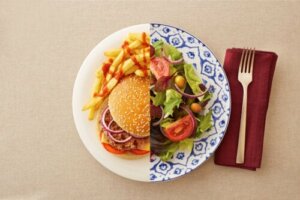The Reverse Dieting Myth


Written and verified by the nutritionist Saúl Sánchez Arias
Reverse dieting is a model that opts for increasing calorie intake in order to maintain body weight. The creators claim that an increase in energy intake can accelerate basal metabolism and lead to an imbalance in the calorie balance in favor of expenditure.
The truth is there are few studies to prove the effects of reverse dieting. In any case, this approach isn’t only about energy, but also about the distribution of calories throughout the day.
What’s reverse dieting?
This kind of diet emerged with the aim of improving body composition. Its main characteristic is an increase in caloric intake but with a different distribution. It opts for a greater consumption during the morning and lunchtime, and then people finish the day with a rather light dinner. They’re to take in most of the calories before 5 pm.
Supposedly, this protocol could help to reduce appetite and avoid anxiety, which determines the adherence to many diets. However, the increase in caloric intake has to be gradual to experience the desired effect. People can try it after following a hypocaloric diet.
Read about Dangerous Diets and Their Warning Signs
How does it work?
According to proponents of reverse dieting, increasing the caloric intake results in a greater thermogenic effect from food, as well as an increase in the basal metabolic rate. Thus, the body should use more energy instead of storing it as fat.
In addition, eating larger amounts of food reduces the secretion of leptin, a hormone that regulates appetite and metabolism. This is responsible for slowing down the metabolic rate, furthering energy savings. However, these effects aren’t scientifically proven.

The science behind reverse dieting
As we mentioned above, there are few studies on reverse dieting out there. However, most weight loss research proposes the opposite model — a hypocaloric diet. In this context, it’s possible to stimulate fat mobilization and oxidation, according to a publication in Nutrition.
There are some alternative protocols to traditional diets that rely on mealtime restrictions, such as intermittent fasting. These have demonstrated benefits when it comes to weight loss. However, there’s a reduction in energy intake beyond the physiological effects.
Nutritional restrictions have also been proposed, but not energy restrictions, as in the case of the ketogenic diet. This model is for the purpose of increasing insulin sensitivity and generating greater fat oxidation. It effectively stimulates weight loss according to a study published in the journal Nutrition & Diabetes.
However, it isn’t possible to find references that provide evidence that an increase in intake will result in a reduction of subcutaneous adipose tissue. At least not in the absence of any pattern of physical exercise that increases expenditure.
What determines weight loss?
The truth is that weight loss isn’t just the result of a mathematical equation. There are other factors that may have a decisive influence. One of them is insulin sensitivity, which modulates the body’s use of fats as a source of energy.
Maintaining a healthy gut microbiota can also have a significant effect on body composition. Digestion and absorption of nutrients, as well as their subsequent utilization and mediation of inflammation, all depend on the gut microbiota.
Finally, a good night’s sleep routine is another factor that makes a difference. This is because the body’s recovery processes mainly take place during rest. As you can imagine, not sleeping enough could alter the metabolism or the physiology of appetite.

Tips for effective weight loss
There are better alternatives than reverse dieting if the goal is to lose weight. Obviously, there must be a low-calorie intake but other measures are as important. The first is to practice strength exercise in order to support muscle gain.
In addition, you must sleep seven or eight hours a day. As for the diet, the key is to consume fresh foods and avoid industrial ultra-processed foods. Furthermore, reduce the intake of refined flour and any derivatives and increase the intake of fermented dairy products.
Find out What You Need to Know About a Low-Carb Diet For Weight Loss
There’s no much scientific basis for reverse dieting
The scientific literature doesn’t really support reverse dieting as a method to lose weight. In fact, there’s no evidence to support this application.
It doesn’t make much sense even from a physiological point of view. This is because there are better options which are backed up by health authorities.
All cited sources were thoroughly reviewed by our team to ensure their quality, reliability, currency, and validity. The bibliography of this article was considered reliable and of academic or scientific accuracy.
- Dellis, D., Tsilingiris, D., Eleftheriadou, I., Tentolouris, A., Sfikakis, P. P., Jr, Dellis, G., Karanasiou, M., Meimari, A., Dimosthenopoulos, C., Lazarou, S., & Tentolouris, N. (2020). Carbohydrate restriction in the morning increases weight loss effect of a hypocaloric Mediterranean type diet: a randomized, parallel group dietary intervention in overweight and obese subjects. Nutrition (Burbank, Los Angeles County, Calif.), 71, 110578. https://doi.org/10.1016/j.nut.2019.110578
- Welton, S., Minty, R., O’Driscoll, T., Willms, H., Poirier, D., Madden, S., & Kelly, L. (2020). Intermittent fasting and weight loss: Systematic review. Canadian family physician Medecin de famille canadien, 66(2), 117–125.
- Goday, A., Bellido, D., Sajoux, I., Crujeiras, A. B., Burguera, B., García-Luna, P. P., Oleaga, A., Moreno, B., & Casanueva, F. F. (2016). Short-term safety, tolerability and efficacy of a very low-calorie-ketogenic diet interventional weight loss program versus hypocaloric diet in patients with type 2 diabetes mellitus. Nutrition & diabetes, 6(9), e230. https://doi.org/10.1038/nutd.2016.36
This text is provided for informational purposes only and does not replace consultation with a professional. If in doubt, consult your specialist.








